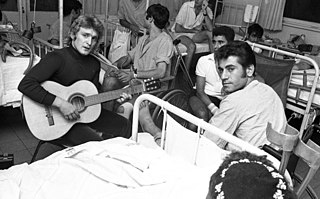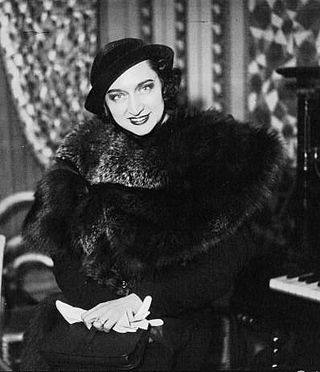
Gilles Vigneault is a Canadian poet, publisher, singer-songwriter, and Quebec nationalist and sovereigntist. Two of his songs are considered by many to be Quebec's unofficial anthems: "Mon pays" and "Gens du pays", and his line Mon pays ce n'est pas un pays, c'est l'hiver became a proverb in Quebec. Vigneault is a Grand Officer of the National Order of Quebec, Knight of the Legion of Honour, and Officer of the Ordre des Arts et des Lettres.

"Le bon roi Dagobert" is a French satirical anti-monarchical and anti-clerical song written around 1787. It references two historical figures: the Merovingian king Dagobert I and his chief advisor, Saint Eligius (Éloi), the bishop of Noyon. The song is directed against Louis XVI and the ties maintained by the Catholic Church with the ancien régime, but it was used more broadly against monarchies in French history.

Gaston Ghrenassia , known by his stage name Enrico Macias, is a French singer, songwriter and musician of Algerian Jewish descent.
Robert Goldman is a French songwriter. He was born in Paris, the son of Alter Mojze Goldman and Ruth Ambrunn who were Jewish Resistance fighters during the Second World War. He is the younger brother of Jean-Jacques Goldman and half-brother of Pierre Goldman.

Martine St. Clair is a Canadian singer from the province of Quebec. She has released numerous albums in a career that has spanned over two decades.

Raymond Berthiaume was a Canadian jazz singer, musician, producer and composer from Quebec, Canada.
Sagesse is a volume of French poetry by Paul Verlaine. First published in 1881, it was important in the symbolist and modernist movements. The subject matter of these poems deals with themes relating to maturing.

Frédéric François, is a French-speaking singer-composer living in Belgium.

Henri Marius Christiné was a French composer of Swiss birth.

Le Temps des cerises is a song written in France in 1866, with words by Jean-Baptiste Clément and music by Antoine Renard, extremely famous in French-speaking countries. The song was later strongly associated with the Paris Commune, during which verses were added to the song, thus becoming a revolutionary song. The "Time of Cherries" is a metaphor regarding what life will be like when a revolution will have changed social and economic conditions. It is believed to be dedicated by the writer to a nurse who fought in the semaine sanglante when French government troops overthrew the commune.

Yvon Éthier better known as Patrick Norman is a Canadian country musician. He sings both in French and English and has had hits in Quebec and in the rest of Canada.
"Sombre forêt" is a soprano aria from act two of the opera William Tell by Gioachino Rossini, to a French libretto by Étienne de Jouy and Hippolyte Bis. It is sung by Mathilde, a princess of the House of Habsburg, as she waits in the forest on the heights of Rütli for her Swiss lover, Arnold Melchthal.
Hollywood Girls : Une nouvelle vie en Californie, or simply Hollywood Girls, is a French soap opera created by Alexandre dos Santos, Jérémy Michalak, and Thibaut Vales for NRJ12. The series features an ensemble cast and follows a groups of French peoples who decided to start a new life in California, but their life is quickly disrupted by the diabolical Geny G and her husband, the Dr. David Moretti.

Tournée Européenne 2013 was the tenth concert tour by Canadian singer Celine Dion. The tour was organized to support the highly successful fourteenth French-language and twenty-fourth studio album Sans attendre (2012), which has sold more than 1.5 million copies worldwide. It also served as initial promotion for Dion's then recently-released English album Loved Me Back to Life (2013), since she incorporated a few songs from this album to the concert's setlist. It was Dion's first dedicated Francophone tour since the D'eux Tour in 1995–1996. With only ten concerts performed, it was also the shortest tour of Dion's career. Overall, the tour grossed an estimated $20 million from nine shows in Europe. The tour would also mark as the final concert tour for the majority of Dion's longtime touring band members consisting of musical director Claude "Mego" Lemay, guitarist André Coutu, keyboardist Yves Frulla, bassist Marc Langais, and violinist Jean-Seb Carré.

Daniel Bevilacqua, better known by the stage name Christophe, was a French singer and songwriter. He was born in the Paris suburb of Juvisy-sur-Orge, to an Italian father.
Lucky Blondo is a French singer who was popular in the 1960s.

Les Feuilles d'Automne is a collection of poems written by Victor Hugo, and published in 1831. It contains a multitude of poems, six of which are especially known as Soleils Couchants.

Lys Gauty was a French cabaret singer and actress. Her most significant work came in the 1930s and 1940s as Gauty appeared in film, and recorded her best-known song, "Le Chaland qui passe", which is an interpretation of an Italian composition.












